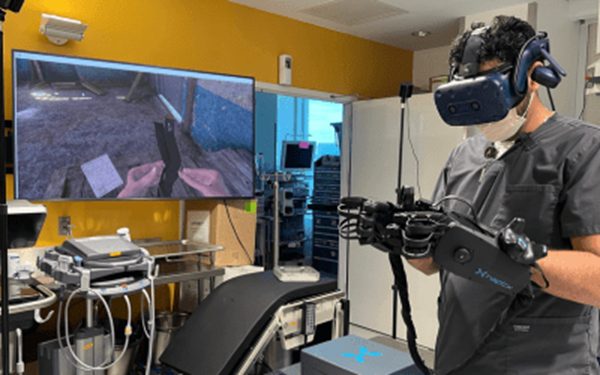
In Virtual Reality News
April 30, 2024 – Engineering & Computer Simulations (ECS), a provider of extended reality (XR) training solutions, has recently announced that it has received a Small Business Innovation Research (SBIR) Phase II award from the Defense Health Agency (DHA) for its Advanced Haptics Development project.
ECS stated that during the two-year project, the first year will focus on creating a microlearning modular content library of virtual reality (VR) and haptics-based scenarios that use intervention levels to train students in a variety of medical procedures relevant to combat and care under fire. The company’s efforts will modularize these various scenarios into a library of content packs that students and instructors can access at a point of need.
The second year of the project will aim to incorporate the HaptX G1 mobile edition haptic glove unit into development. Throughout the project, Mayo Clinic Jacksonville will provide subject matter support and user testing.
“Our ECS team has been incorporating haptics technology into our projects for several years now in order to provide more realistic and more memorable training so that our warfighters can receive the best emergency care,” said Waymon Armstrong, ECS’ founder and CEO. “We’re proud to support the Army in their efforts to improve the readiness of medical personnel serving in harm’s way and to save more lives.”
ECS stated that its plan is to ultimately use networked, collaborative multiplayer features to allow combat medics and combat life savers to train and work together using haptics in a VR environment. The application will also provide options to have instructors and observers watch students during training, with instructors able to interact in scenarios to assist students in learning different procedures.
The company added that typically, students carry out the above noted training procedures via different applications. However, as a result of the project, they will be in one location for easier access. ECS stated that once it integrates the new version of the HaptX G1 system, students will gain improved mobility and ease of use, particularly when training for larger-scale scenarios.
The multiplayer features and multirole scenarios that ECS will further develop as part of the SBIR award will also help to expand the applicable audience for training and improve commercialization value for dual-use applications such as civilian training markets, according to the company.
For more information on ECS and its XR training solutions, please visit the company’s website.
Image credit: Engineering & Computer Simulations
About the author
Sam is the Founder and Managing Editor of Auganix. With a background in research and report writing, he has been covering XR industry news for the past seven years.




